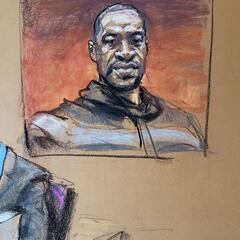Derek Chauvin on trial for George Floyd death: what charges were presented?
The former Minneapolis police officer's trial continues as prosecutors bring charges including manslaughter and murder against the 45-year-old.


On Tuesday prosecutors continued presenting the case against Derek Chauvin, the former Minneapolis police officer facing multiple charges in connection with the death of George Floyd last summer.
The case garnered international attention and sparked global protests that formed part of the Black Lives Matter movement. Chauvin was filmed pressing his knee into Floyd’s neck for nine minutes but has pleaded not guilty to all three counts brought against him.
Yesterday Minneapolis firefighter Genevieve Hansen gave testimony in which she said the police officers at the scene would not let her carry out potentially life-saving medical assistance to the unconscious man.
Genevieve Hansen, an off-duty firefighter at the scene of George Floyd's death, gets emotional during testimony at Derek Chauvin trial.
— NBCBLK (@NBCBLK) March 30, 2021
Hansen says she would have given Floyd chest compressions, but "officers didn't let me into the scene." pic.twitter.com/c8S4Ha7KAq
Hansen told the court: "There's a man being killed, and had I had access to a call similar to that, I would have been able to provide medical attention to the best of my ability, and this human was denied that right.”
This could well be crucial in the prosecution’s case as they look to prove Chauvin’s guilt, but what has the former officer been charged with?
Second-degree unintentional murder
Of the three charges brought against Chauvin, second-degree unintentional murder is the most serious and holds the longest prison sentence if found guilty.
To do so the prosecution must prove that Chauvin’s actions caused “the death of a human being without intent to effect the death of any person, while intentionally inflicting or attempting to inflict bodily harm upon the victim when the perpetrator is restrained under an order for protection and the victim is a person designation to receive protection under the order."
I don’t know if Derek Chauvin will be convicted, but I do know this: George Floyd would not have died that day if Chauvin hadn’t done what he did.
— Joe Walsh (@WalshFreedom) March 31, 2021
The maximum sentence for this charge is 40 years, but Minnesota sentencing guidelines recommend a prison term between 10 years and nine months to 15 years.
Third-degree murder
The other murder charge brought against Chauvin is third-degree murder, a recent reintroduction that prosecutors hope will provide another pathway to conviction.
Chauvin will be found guilty if he is proved to have “without intent to effect the death of any person, cause[d] the death of another by perpetrating an act eminently dangerous to others and evidencing a depraved mind, without regard for human life."
Derek Chauvin's trial for the killing of #GeorgeFloyd begins today with opening statements.
— AJ+ (@ajplus) March 29, 2021
▪️ Charges: 2nd-, 3rd-degree murder, 2nd-degree manslaughter
▪️ Jury: 9 of 15 are white
▪️ Timeline: expected to take 4 weeks
▪️ Courthouse: surrounded by concrete barriers, razor wire pic.twitter.com/SS8sIDTIgX
The former officer could face up to 25 years in prison if found guilty, although the only other Minnesota police officer to be convicted for murder while on duty received half that. In 2019, former officer Mohamed Noor was convicted of third-degree murder for the death of Justine Damond, who he shot while attending a 911 call made by the victim.
Second-degree manslaughter
Related stories
The final charge facing Chauvin is one of second-degree manslaughter, which will be easier for the prosecutors to prove but carries a lighter prison sentence than the two murder charges. Minnesota prosecutors must argue that Chauvin is guilty of "culpable negligence whereby the person creates an unreasonable risk and consciously takes chances of causing death or great bodily harm to another."
If found guilty he could face up to 10 years in prison and a $20,000 fine. However state guidelines recommend a sentence of between 41 and 57 months in prison.

